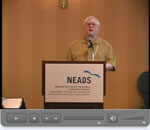
Workshops - Solutions to Library/Print Material Access
Solutions to Library/Print Material Access
Anthony Tibbs
| Video |
 |
Anthony is in his third year of the combined civil/common law program at McGill University. He holds an undergraduate degree in business/commerce from the University of Ottawa. Partially sighted from birth, he has been both a large print and Braille/e-text user through his academic career. He is heavily involved in the activities of numerous consumer organizations, and has a keen interest in increasing the availability of materials (academic and otherwise) in the format of choice for students with disabilities.
Abstract
Technology has helped to reduce the gap for many students (and citizens) with disabilities, but it has not closed that gap. Scanners and OCR software have allowed much more material to be made available to print-disabled Canadians. But converting materials can be a very labour-intensive, time-consuming process, for which busy students have little extra time.
This presentation will focus on Anthony’s view that consistency and collaboration between all large purchasers can help improve the situation. Public and academic libraries must begin to demand that publishers ensure alternative format versions of their books will be available, as a condition of purchase. He will discuss ideas for “best practices” publishers could employ to ensure this is achieved in a quick, cost-effective manner.
Files
- Anthony Tibbs : 482.50 KB
Summary
Anthony Tibbs focused his presentation on the role publishers can take to ensure accessibility for print-disabled people.
”Access to information is a fundamental right of Canadians,” Tibbs said. He referred to section 32 of the Copyright Act, which provides exemptions for reproducing material for those with print disabilities. However, the exemptions do not allow large-print copies, and only individuals and non-profit or charitable organizations may make reproductions. Private companies cannot do so without the publisher’s permission.
Moreover, even if the publisher gives permission or provides an electronic file, sometimes it attaches restrictions, such as precluding Braille copies or requiring permission for every book.
Tibbs said scanners and optical character recognition (OCR) technology have made positive impacts, but they are time consuming, can introduce errors, and may not offer the format required. Meanwhile, little of the 5% of publicly available multiple format materials is useful for academic and technical studies, and some formats require specialized devices to enable access.
Ideally, Tibbs said, publishers should make alternative format publication part of the production process. This would increase the cost per unit only slightly, and the additional cost could be treated like a levy for serving the public good. Less ideally, publishers should commit to providing electronic files to alternative format producers. But because the market requiring alternative format materials is small, Tibbs said, publishers have little incentive to care.
To make them care, Tibbs proposed targeting large institutional purchasers, such as libraries and professors, to have them choose books based on whether the publisher will make those books available in alternative formats.
Funders can channel alternative format production funding into incentives for non-profit producers, and government can require authors and publishers who receive grant funding to make their material available to alternative format producers. Tibbs also suggested developing funding assistance initiatives to encourage alternative format production. One such initiative is the Book Industry Development Program of the Department of Canadian Heritage.
However, the key solution is to incorporate alternative-format production into the publishing process, “where it should be done in the first place,” Tibbs concluded.

